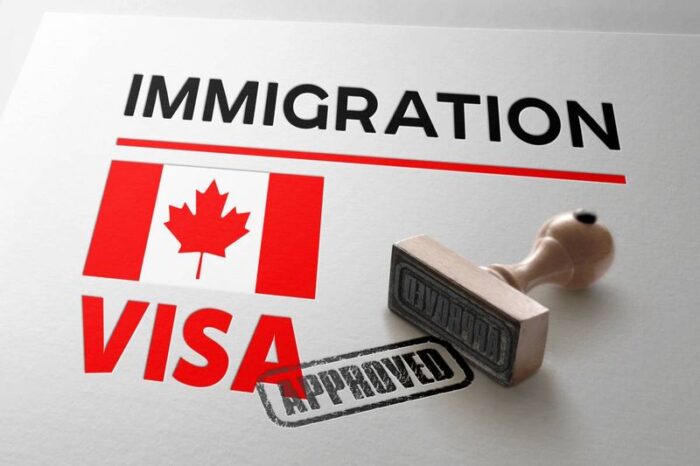
With top-notch healthcare, a strong economy, and diverse culture, an increasing number of expats and foreigners are deciding to make Canada their permanent home. Canada is cleaner, friendlier, and has a higher standard of living than many other countries.
However, before you can make a move, you must first complete the necessary stages. Continue reading to learn everything you need to know about how foreigners can immigrate to Canada.

1. Express Entry
One of the most popular immigration paths for qualified workers is Express Entry. It began in 2015 and has since provided the Canadian government with a steady stream of talented immigrants.
Express Entry in Canada is a point-based system in which candidates are rated based on a predetermined set of criteria that converge to a final score. Following that, candidates are invited depending on their performance in the Express Entry Pool.
Eligibility:
- Anyone with a bachelor’s degree, a master’s degree, or a doctorate degree (or Ph.D.) is eligible to apply. The greater the degree, the more points are awarded.
- At least 2 years (within the last 5 years) of experience in a skilled trade in one of the NOC B main groups (Federal Skilled Trades Program) criteria
- You gain additional points if you have 1 year of Canadian experience in NOC 0, A, or B (Canadian Experience Class) during the last three years.
- Candidates under the age of 29 receive more points; after that, 5 points are deducted as they grow older.

2. Provincial Nominee Program (Canada PNP)
If you want to migrate to Canada to become a permanent resident, the Provincial Nominee Program (Canada PNP) is the second-best option. It is the most incredible option for those unable to meet the Canada express entrance eligibility standards. The PNP is the most effective means for provinces to hire talented workers from all over the world who have the necessary skills to contribute to the province’s development, thereby bridging the gap in the Canadian labor market.
Specific PNP streams, known as “enhanced streams,” are matched with Canada express entries. Obtaining a nomination by applying for the Canada PNP via express entry earns you an extra 600 points, boosting your CRS score and increasing your prospects of establishing a new life in Canada.

3. Start-up Visa
Immigrant investors can also apply for a Start-up Visa, which allows them to stay in Canada permanently.
The program aims to bring innovative entrepreneurs to Canada and connect them with private sector enterprises in the country, such as angel investor groups, venture capital funds, and business incubators, to help them launch their new venture.
A designated venture capital fund must confirm that it will make an investment of at least $200,000 in the qualifying company. Candidates may also qualify if they have received two or more commitments totaling $200,000 from specified venture capital funds. At least $75,000 must be invested by an angel investor group in the qualifying company.

4. Study Permit in Canada
As an international study location, Canada offers the chance to receive a world-class education in a multi-cultural context, making it a worthwhile selection. Many students regard this as a first step toward becoming permanent residents and, eventually, Canadians, thanks to Canada’s accommodating immigration policy.
Requirements to apply for Student Permit in Canada:
- A DLI acceptance letter is required to apply for a study visa. A DLI is a school that has been approved to host international students by a province or territorial government.
- Having all of the essential documents arranged and available (proof of acceptance, proof of identity, proof of financial stability, etc.) will ensure that you are well-prepared for a successful application.
- If you wish to travel to Canada, you may need to undergo a medical examination. It is to ensure that you are not ineligible due to a medical condition.
- While applying as a student, you may be required to obtain a police certificate. This is done to see whether you have a criminal record and make sure you aren’t ineligible to enter Canada.
These students can work in Canada under the following categories if they have been granted a study permit:
- Without a work permit on campus;
- With a work permit off-campus;
- With a work permit in co-op and internship programs that include job experience as part of the curriculum.
An international student can apply for a work permit under the Post-Graduation Work Permit Program once they have graduated. The work visa may be awarded for up to three years, depending on the length of the study program.

Time To Move To Canada
The most challenging element of the procedure isn’t finding and obtaining a visa. When you are welcomed into the country and must begin preparing to relocate, the hard work begins. You can’t just fly there tomorrow. Before you leave, there are a few things you need to take care of.
It’s a good idea to start saving money and getting your finances in order before relocating anywhere. You may be required to prove your assets as part of the immigration procedure to Canada, so don’t overlook this aspect.
Consulting with immigration advisors such as Bellissimo is the best way to avoid any kind of trouble during Canadian immigration. Seeking help from professionals will only make your work easier and hassle-free.

Conclusion
Living and working in Canada is a fantastic experience. However, before you decide to relocate, you must first complete your homework. If you have a criminal record, the first step is to see if you are eligible for admission.
Once you’ve determined whether you’re eligible, look into the various types of immigration visas available. Choose the province where you want to live and see if you qualify. After you’ve finished those processes, you can apply for your visa.
It’s best to obtain a job before you relocate. Bring all your crucial paperwork along to avoid any last-minute screw-ups. Make sure your funds are in order. Look for a place to live and spend some time learning about Canadian culture.
















